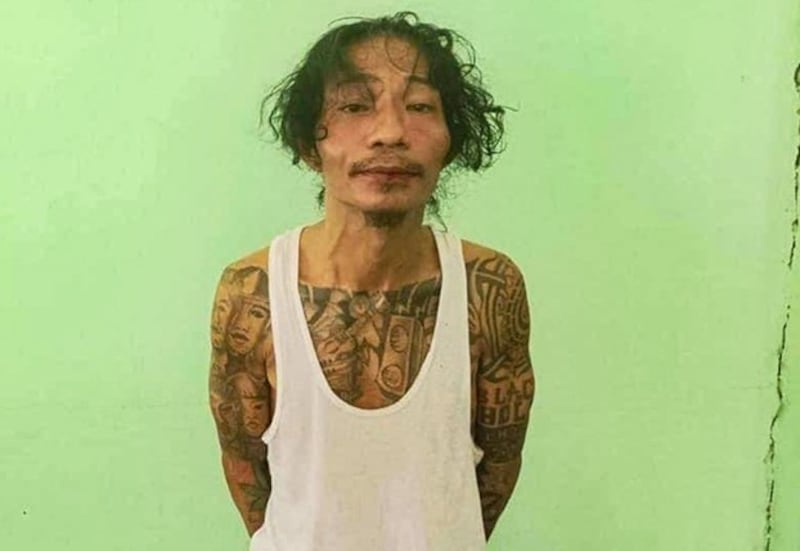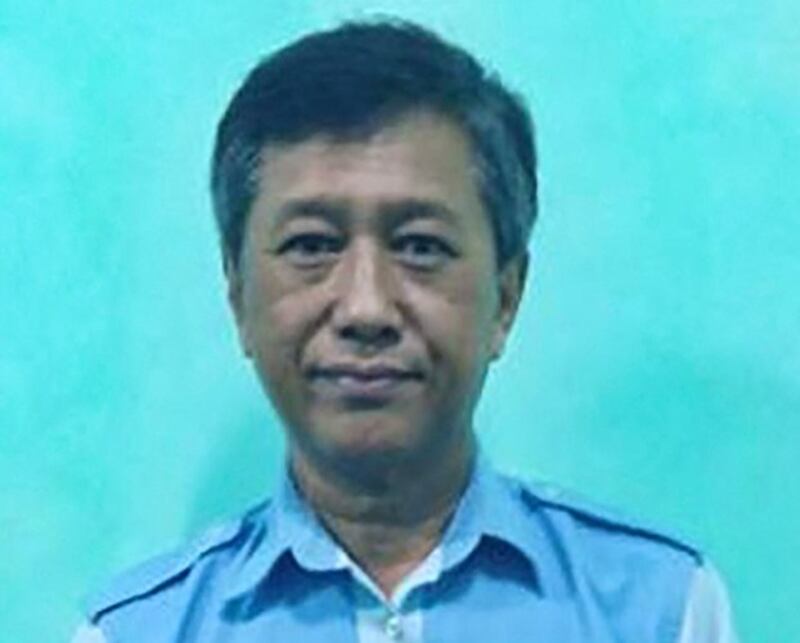Byu Har went too far with his online criticism of Myanmar’s ruling military junta in May and paid a heavy price.
The 38-year-old hip-hop artist based in Yangon livestreamed on Facebook complaints against Myanmar’s Ministry of Electricity and Energy for nationwide power outages. He called the country’s leader Snr. Gen. Min Aung Hlaing “incompetent” and the head of the ministry a “fool” for not securing sufficient power supplies.
With scraggly black hair and tattoos covering his arms and chest, Byu Har said life had been better under the democratically elected government that the ruling military junta overthrew in a February 2021 coup.
He then provoked the regime’s authorities, saying, “If you want to arrest me, just come.” And they did just that.
Police detained Byu Har in Yangon's North Dagon township on May 23 for openly criticizing the ruling junta's leadership online. Three months later, he was sentenced to 20 years in prison for incitement to overthrow the state.
Before his arrest, authorities issued several warnings to him for producing music critical of the junta, according to a BBC report.

Byu Har, son of prominent musician Naing Myanmar, is among the numerous individuals the regime has detained as a part of its widespread measures to suppress opposition and criticism – some of which has been expressed on the internet.
Myanmar is the world's second-worst country – after China – for violating internet freedom according to the latest annual report on online freedom of expression issued Wednesday by Washington-based Freedom House.
“Under military rule since a 2021 coup, the country’s internet users continued to express support for the democratic resistance movement or grief for the victims of the junta’s violence, all at great personal risk to themselves,” the report says.
The report went on to note that the regime and its informants have used Telegram groups to share information on dissidents, so that authorities can identify, detain, and in some cases forcibly disappear them.
Junta's internet offenses
The study of human rights online assesses internet freedom in 70 countries, accounting for 88 percent of the world’s internet users, and covers developments between June 2022 and May 2023.
More than 85 analysts and advisers determined each country’s internet freedom score on a 100-point scale based on 21 separate indicators pertaining to obstacles to access, limits on content, and violations of user rights.
The Freedom House report said the most egregious case was the junta’s execution of prominent activist Kyaw Min Yu, better known as Ko Jimmy, in July 2022, after arresting him for pro-democracy social media posts.

In another notable offense, junta officials also forced the sale of the country’s last internet service provider that had a degree of independence to a state-connected firm in September 2022, to implement censorship without resistance from the private sector, the report says.
The junta restricts Burmese citizens from accessing social media platforms like Facebook and Viber on their mobile phones. It also has reduced broadband speeds, cut internet connections, blocked some text and calling services in areas where anti-regime resistance has been strong. These areas include Kachin, Kayah, Chin and Rakhine states as well as many townships in Sagaing, Magway and Tanintharyi regions.
From February 2022 to the end of this April, the junta took action against at least 1,050 social media user accounts on Facebook, TikTok and Telegram and other social media platforms, which contained or shared information critical of the regime, according to publicly released information.
As a result, prominent figures from politics, civil society and the creative industry as well as ordinary citizens from all over the country were detained.
In 55 of the 70 countries documented by the “Freedom on the Net” report, authorities prosecuted people for expressing their thoughts online. And in 41 countries, including Myanmar which had the most severe violations, people were physically attacked or killed for commenting online, especially in written social media posts.
A chilling effect
The junta’s crackdown has had a chilling effect.
A Yangon resident, who declined to be named for safety reasons, said that because of these arrests, she dares not express her opinions online about politics or the armed resistance to the junta.
“After the coup, we have had less internet freedom. … I’m always worried that I can be arrested if I write or share something,” she said.
Nay Phone Latt, spokesman for the Prime Minister’s Office of the shadow National Unity Government, told RFA that the junta is suppressing freedom of the internet in various ways for two reasons.
“One [reason] is to instill fear among the people, and the other is that they do not want the world to know about what is really going on in Myanmar and what the genuine wishes of the people are,” he said.
RFA could not reach junta spokesman Maj. Gen. Zaw Min Tun for comment, though he said in May 2022 that anyone who advocates for or supports the parallel government and lawmakers who were unable to take their seats because of the coup will be charged under Myanmar’s Counter-terrorism Law.
Junta-controlled dailies frequently warn that individuals who knowingly or unknowingly are associated with opposition organizations can also be charged under certain statutes of the Penal Code and Telecommunications Law.
Human rights expert Zaw Win at Fortify Rights, a rights group based in Southeast Asia, said the junta’s multifaceted controls are a brazen violation of the right to free speech.
“Everyone has the right to speak freely,” he said. “It is an individual’s personal right, and no one can prevent it. But it is absolutely unacceptable for the military to rely on their weapons to block people’s right to freedom of speech and freedom of assembly by unjust means.”
Translated by Htin Aung Kyaw for RFA Burmese. Edited by Roseanne Gerin and Joshua Lipes.
